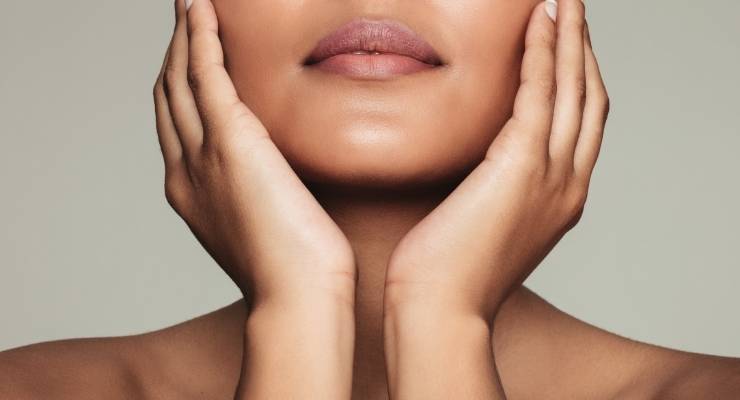07.25.22
Daily supplementation with heat-killed Lactobacillus plantarum L-137, the primary ingredient in House Wellness foods’ Immuno-LP20, was evidenced in a recent human clinical study to help prevent skin from drying, as well as improve self-reported measures of skin quality among participants.
Eighty healthy participants (20 men, 60 women; mean age, 47.3 years) who were aware of dry skin issues were administered either a daily supplement of HK L-137 or a placebo. HK stands for heat-killed, distinguishing the bacterium found in Immuno-LP20 from other postbiotics.
Every four weeks, water content and transepidermal water loss (TEWL) were measured at the forearm and face, and participants completed two skin-related questionnaires, the Dermatology Life Quality Index (DLQI), a clinical standard, and a self-evaluation.
Water content in the skin of those who took the supplement greatly increased, according to the study. According to House Wellness Foods, skin barrier dysfunction is most commonly attributed to diminished ceramides and hyaluronan, as well as disordered structures in the stratum corneum and granular layers of the skin. Skin then becomes dry and flaky, while irritants, allergens, and pathogens can more easily penetrate, causing inflammation and other issues.
While T helper type-2 cells accelerate this corneal breakdown, Th1 cytokines are shown to upregulate HA, ceramide, and filaggrin in human keratinocytes. HK L-137 improves Th1-related immune functions and is regarded as a potent inducer of IL-12, which promotes activation of Th1-related immune responses, blocking destructive Th2 effects. Additionally, studies have shown that HK L-137 increases HA production by inducing IFN-γ and tumor necrosis factor (TNF-α) in fibroblasts to suppress loss of skin moisture.
The researchers noted that they were most surprised by the fact that HK L-137 had good results on moisture retention in the group that was over 48 years old.
“Aging and dryness […] are major factors that disturb skin functions,” the authors noted, and aging can be as deleterious to gut permeability as to skin barrier moisture retention. Instead, it is likely that the combination of positive effects on the epidermal barrier by strengthening the intestinal barrier, along with enhanced production of HA that resulted in disproportionately higher water retention at face and forearm in the elder group, compared to the control group.
Further, the DLQI score for overall satisfaction with skin condition, characterized by self-reported itching, burning, stinging, and tightness, improved significantly in the supplementation group compared to the control.
HK L-137 was first researched for its positive associations with upper respiratory tract infections, but the company became concerned with the strain’s unique capacity for acting upon immunomodulatory resources on multiple levels, according to the company.
Eighty healthy participants (20 men, 60 women; mean age, 47.3 years) who were aware of dry skin issues were administered either a daily supplement of HK L-137 or a placebo. HK stands for heat-killed, distinguishing the bacterium found in Immuno-LP20 from other postbiotics.
Every four weeks, water content and transepidermal water loss (TEWL) were measured at the forearm and face, and participants completed two skin-related questionnaires, the Dermatology Life Quality Index (DLQI), a clinical standard, and a self-evaluation.
Water content in the skin of those who took the supplement greatly increased, according to the study. According to House Wellness Foods, skin barrier dysfunction is most commonly attributed to diminished ceramides and hyaluronan, as well as disordered structures in the stratum corneum and granular layers of the skin. Skin then becomes dry and flaky, while irritants, allergens, and pathogens can more easily penetrate, causing inflammation and other issues.
While T helper type-2 cells accelerate this corneal breakdown, Th1 cytokines are shown to upregulate HA, ceramide, and filaggrin in human keratinocytes. HK L-137 improves Th1-related immune functions and is regarded as a potent inducer of IL-12, which promotes activation of Th1-related immune responses, blocking destructive Th2 effects. Additionally, studies have shown that HK L-137 increases HA production by inducing IFN-γ and tumor necrosis factor (TNF-α) in fibroblasts to suppress loss of skin moisture.
The researchers noted that they were most surprised by the fact that HK L-137 had good results on moisture retention in the group that was over 48 years old.
“Aging and dryness […] are major factors that disturb skin functions,” the authors noted, and aging can be as deleterious to gut permeability as to skin barrier moisture retention. Instead, it is likely that the combination of positive effects on the epidermal barrier by strengthening the intestinal barrier, along with enhanced production of HA that resulted in disproportionately higher water retention at face and forearm in the elder group, compared to the control group.
Further, the DLQI score for overall satisfaction with skin condition, characterized by self-reported itching, burning, stinging, and tightness, improved significantly in the supplementation group compared to the control.
HK L-137 was first researched for its positive associations with upper respiratory tract infections, but the company became concerned with the strain’s unique capacity for acting upon immunomodulatory resources on multiple levels, according to the company.




























